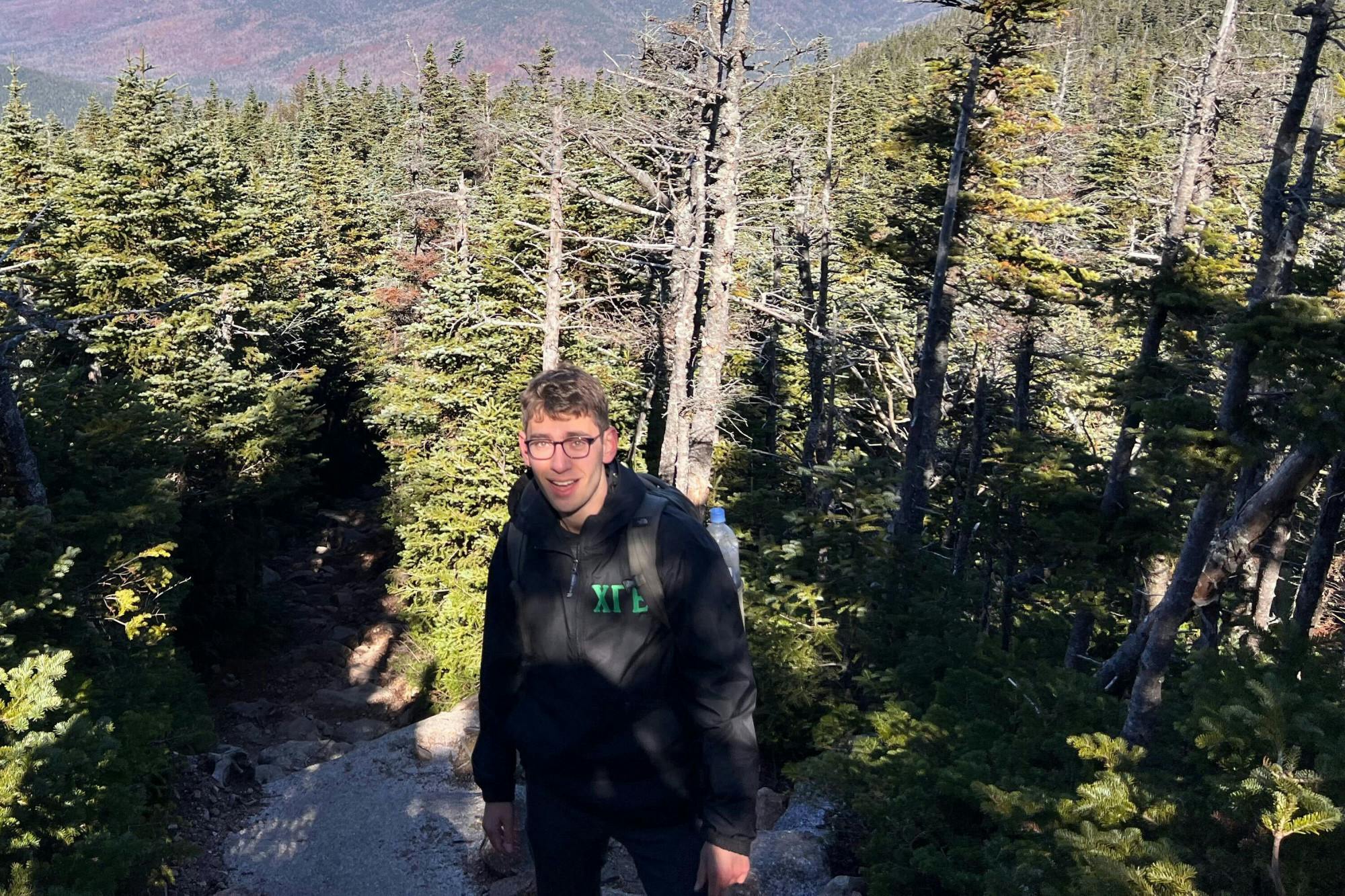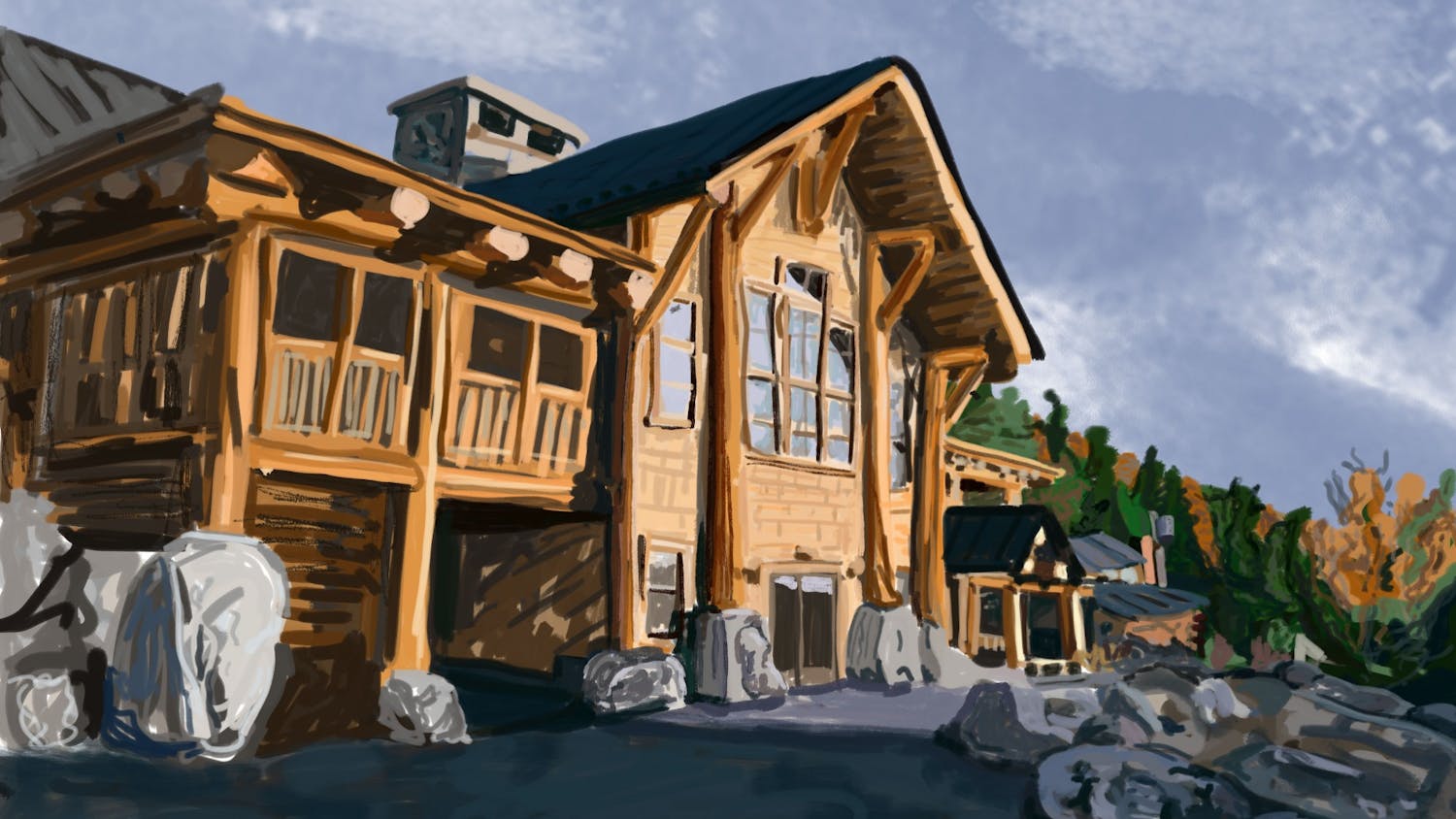Sept. 4, 2019 was a day of many firsts. It was the first day of college, my first day of adulthood (my 18th birthday), the first day of First-Year Trips and my first day in squeaky new hiking shoes. As I packed my borrowed framepack with necessities for the upcoming hike, it struck me more concretely: I was no longer in suburbia. In fact, my hometown of Scarsdale, New York was far behind me. I parted ways with my parents, split a surprise Lou’s birthday cake with my fellow tripees and mentally prepared to “rough it” for the first time in my life.
After a (largely sleepless) first night of “camping” on the turf in the Leverone field house, we awoke fueled by adrenaline and excitement. Stepping outdoors, we embarked in the morning on the Hiking II trip, and my relationship with the great and wild New England outdoors — in my eyes, “The North” — began.
That second night, we slept under a lean-to tarp on uneven ground — seven or eight strangers bound by cheerful discomfort. During the trip, we did our business outside — a first for me — and we kept our energy up with chunks of Cabot cheese and powdered hummus. At night, by flashlight, we hoisted our bag of food into the tree to bear-proof our site. By the end, my shiny hiking shoes had started to show a few signs of use, I had met some friendly faces and I considered First-Year Trips a rich and resounding success.
The ensuing four years and stories do not constitute a memoir of adventure on the scale of Bill Bryson’s Appalachian Trail saga, “A Walk in the Woods.” After all, I have been busy with classes, friends, on-nights and the other predictable rhythms of college life. But, the natural landscapes of New England have formed the backdrop of the most meaningful parts of my Dartmouth experience, in ways both predictable and unexpected.
What draws us to this place? I often tell friends or family that when I step outside of my typical indoor haunts: Baker-Berry Library, Silsby Hall, Foco or Robinson Hall (The Dartmouth headquarters) — I am greeted by a burst of New Hampshire air. That unparalleled scent of pine, that subtle chill which lingers from September to May, is an ever-present reminder of the mountains to the North, the river to the West and the vast coniferous forests around us. The outdoors — the backdrop of our experience here — has increasingly provided a mirror for myself, my identity and my four formative years at Dartmouth.
Freshman fall was a whirlwind of new clubs, friends, interests and stressors. It was also the beginning of my relationship with Occom Pond, Mink Brook, Pine Park and other Hanover gems. Feeling newly adult and independent of my parents, I ran countless loops around Occom, sauntered across Ledyard bridge, got lost in Pine Park and generally felt adventurous — despite all this being some two miles from my home base in Wheeler Hall (the veritable palace of freshman dorms).
The pandemic and its many challenges only forced me further into the outdoors for respite. Back in New York, I traded in pines for masks and busy parkways, but I still found pockets of sunshine and trees to explore with friends and family.
In fall of 2020, I cashed in my off-term for a spiritually engaging, five-month trip to Israel. There, I connected with my religion and culture and spent time basking in the country’s Edenic natural beauty. I hiked with a group from the Mediterranean Sea to the Sea of Galilee, a six-day adventure full of hot arid days, cool starry nights and exciting encounters with a motley crew of fellow hikers on the shvil, or trail. We cooled off in natural springs and waterfalls and learned to hike quietly and reflectively. I returned to a frozen Hanover for winter term, tan and hopeful.
The winters here are unlike those of my upbringing. They arrive quickly, burning the green leaves to orange and driving us indoors to escape into laptops and textbooks. Screenshots of -10 and -15 degrees Fahrenheit on the weather app provided excellent fodder for home friends to poke fun at me. One close friend from home — and my roommate next year in New York City — even used the term “Stockholm syndrome” to describe my approach to Hanover’s landscape and weather extremes. I could not disagree more. The piercing polar wind, the ice and the blinding white of our snow days never failed to impress me and fill me with inexplicable joy.
Sophomore year was also my first experience of a New Hampshire spring. In March, on an unseasonably warm day at the end of winter term, I took off for the White Mountains, part of The North, which had previously been a looming presence in my mind. The newly reborn sun (is my affinity for the sun clear yet?) streamed in my car windows as I hurtled up I-91 in Vermont. The bare trees flashing by, I soon made a right into New Hampshire to follow NH-116 east toward Jefferson in Coös County.
Once in the White Mountains, which were far more severe and imposing than I had imagined, I traveled the Kancamagus Scenic Highway — a 30-plus mile stretch of road from Lincoln, NH to Conway, NH with no gas stations, stores or stops besides trailheads. The day ended at the Mount Washington Hotel in Bretton Woods, NH, a red-roofed wonder set beside the state’s highest peaks.
Junior year brought new outdoor experiences of greater scale and scope. In the same hiking shoes from freshman year, which now showed some admirable wear and tear, three friends and I climbed Mt. Washington. Over four grinding hours, we made our way through mist and rain toward the infamously windy summit. Though it was 70 and sunny at the base, the summit that day had wind chills in the 20s and sustained wind speeds over 50 miles per hour. Laughing and shouting over the gusts, we watched in awe as the rainclouds whipped away unexpectedly, bathing us in sunlight and opening majestic views in every direction.
During senior year, outdoor adventures provided a brief outlet to slow down the time that suddenly felt too limited. Trips with close friends to Mt. Osceola, Mt. Cardigan and Mt. Ascutney were each meaningful in their own right. Just this weekend on Mt. Cardigan, a close friend and I sat atop the rocky summit sipping on Powerade and listening to the breeze. We were from the same town, but had not become close until arriving at Dartmouth. He said, “Could you have imagined 10 years ago that we would be here on top of Mt. Cardigan together?” I think I can speak for us both when I say that it was a moment of incredible peace and gratitude.
This spring, my increasingly beloved “Daily Dip” has provided a grounding (and refreshing) natural ritual to my afternoons which I will miss greatly. There is an air of magic to leaving class each afternoon, throwing on a bathing suit and diving into the cool depths of the Connecticut river — all within 15 minutes. Even on the busiest of days, the return to the river puts issues in perspective and allows me to connect directly with nature, those around me and myself.
Outside of studying government and the remarkable systems, innovations and failures of mankind, Dartmouth gave me the privilege and opportunity to learn more about the natural world — not just throughout my experiences in the outdoors, but also in my classes. My worldview is now forever informed by our changing climate, the steady march of plate tectonics, the neuroscience of animal behavior, the natural arithmetic of thunderstorms and other wonders. In this special place, I found new meaning in wind, sunshine, rain, snow, flora, fauna, frigid winter nights and sweltering summer days.
The end of the term is nigh, and the unpredictable tides of life are pushing me and my friends to different places across the globe. Still, I know we will all take different aspects of The North with us on our journeys. There is something unquestionably appealing and impossible about The North. Even in summiting Mt. Washington or other mountains in New Hampshire, The North feels like a dream just beyond reach, but one always worth seeking out.
Jacob Strier is a former managing editor of The Dartmouth and a member of the Class of 2023.




